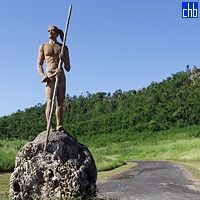CUBAN POPULAR PHRASES: REMINDING OF THE QUISQUEYANO HATUEY, FIRST REBEL OF AMERICA.
The cacique Hatuey to the front of about 400 men armed with stones and sticks confronted the Iberian forces in the eastern region of Cuba
Hatuey, considered the First Rebel of America, was a Taino cacique from Quisqueya (Dominican Republic) who fought against the Spanish conquistadors on that island, Haiti and Cuba, and today lives in the picaresque creativity of the people
He arrived at the largest of the Antilles after being expelled by the Spaniards from his native land and when he came in contact with the members of the Taino tribes in the eastern territory called them to fight against the invaders.
After explaining that it was necessary to get rid of all the gold from the rivers because that was the god of the whites, he led a revolt in the region and began to attack the Spaniards who were already settled in the area of Baracoa.
The Spaniards, led by Diego Velazquez, who knew the tactics of the primitive inhabitants of Cuba, were dedicated to eradicating each of the rebel groups little by little, relying on an overwhelming technological superiority
Hatuey, was captured and condemned to the stake, a punishment reserved for the vilest criminals, but before being set on fire by a priest he tried to persuade him to become a Christian to forgive his earthly sins and to reach the kingdom of heaven.
Then the Indian chief, already about to die, asked: “And the Spaniards also go to heaven?” And when he received an affirmative answer he said: “I do not want to go there, but to hell, not being where they are and not See such cruel people. ”
The aboriginal guerrilla was burned alive near the Yara river, located in the present province of Granma and from that torture was born the phrase “It is necessary to give candela like Indian Hatuey”, of deep rooted popular among the Cubans.
This is one among many that get into the hearts of people as a result of the improvising conscience of the Creole and is used to refer to who is practically impossible to remove it from a place or make it change its mind.
FRASES POPULARES CUBANAS: EN RECUERDO DEL QUISQUEYANO HATUEY, PRIMER REBELDE DE AMERICA.
El cacique Hatuey al frente de unos 400 hombres armados con piedras y palos enfrentó a las fuerzas ibéricas en la región oriental de Cuba
Hatuey, considerado el Primer Rebelde de América, fue un cacique Taíno proveniente de Quisqueya ( República Dominicana) que luchó contra los conquistadores españoles en esa isla, Haití y Cuba, y hoy vive en la picaresca creatividad del pueblo
Arribó a la mayor de las Antillas después de ser expulsado por los españoles de su tierra natal y al entrar en contacto con los miembros de las tribus taínas existente en el territorio oriental los llamó a luchar contra los invasores.
Tras explicarle que era necesario deshacerse de todo el oro de los ríos porque ese era el dios de los blancos, encabezó una revuelta en la región y comenzaron a atacar a los españoles que ya se asentaban en la zona de Baracoa.
Los españoles, dirigidos por Diego Velázquez, conocedor las tácticas de los primitivos habitante de Cuba, se dedicaron a erradicar poco a poco a cada uno de los grupos rebeldes apoyándose en una abrumante superioridad tecnológica
Hatuey, fue capturado y condenado a la hoguera, castigo reservado a los más viles criminales, pero antes de prenderle fuego un sacerdote trató de convencerlo de convertirse en cristiano para perdonar sus pecados terrenales y alcanzar el reino de los cielos.
Entoces el jefe indígena ya a punto de morir pregunto: “¿Y los españoles también van al cielo?” y al recibir una respuesta de afirmación dijo: “No quiero yo ir allá, sino al infierno, por no estar donde estén y por no ver tan cruel gente. “
El guerrillero aborigen fue quemado vivo en las cercanías del rio Yara, ubicado en la hoy provincia de Granma y de aquel suplicio nació la frase “Hay que darle candela como al Indio Hatuey”, de profundo arraigo popular entre los cubanos.
Esta es una más entre tantas que se meten en el corazón de la gente como fruto de la conciencia improvisadora del criollo y se utiliza para referirse a quien es prácticamente imposible sacarlo de un lugar o hacerlo cambiar de parecer.
Agencies/Arrajatabla/Alberto Denis/Internet Photos/ Arnoldo Varona/ TheCubanHistory.com
THE CUBAN HISTORY, HOLLYWOOD.








